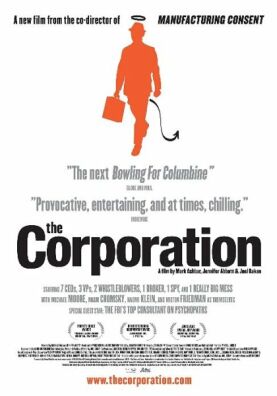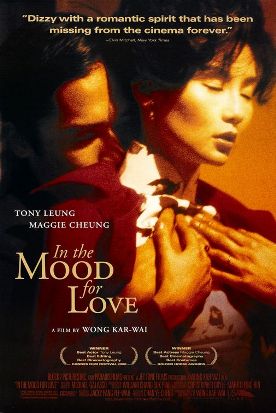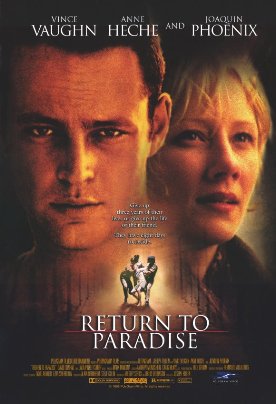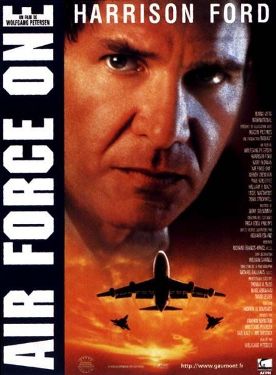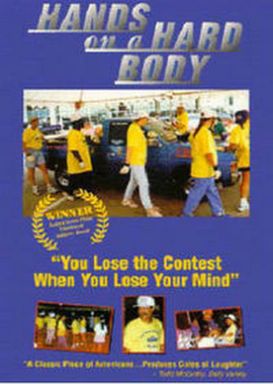Corporation, The
The Corporation, directed by Mark Achbar and Jennifer Abbot and written by Joel Bakan, adapting his own book, begins with a patent untruth, namely that “the corporation is all-pervasive like the church, the monarchy or the communist party in other ages.” Ah, but the corporation is precisely unlike the church, the monarchy or the communist party in being multiple, not unitary. Nike is not Xerox is not McDonald’s. These corporations may be, as the film attempts to argue, all alike in their reliance on human or environmental exploitation, but they are not the same — a difference that is crucial if you are a peasant unfortunate enough to have got on the wrong side of those with the power and the money.
Nor is this just a casual mistake or characteristic overstatement, since the film moves rapidly on to consider and reject the proposition, voiced by a host of eminent speakers in what must be one of the most over-used metaphors of our time, that Enron and other corporate malefactors are just “some bad apples” needing to be plucked from the proverbial barrel. Mr Bakan and his collaborators have nothing but scorn for this notion because it is essential to their argument to suggest that there is something in the very nature of limited liability companies in general and of American multinational corporations that produces exploitation and misery. This “something” is its legal obligation of fiduciary responsibility to its shareholders.
For so long, that is, as the corporation is required by law to be governed only by those with a financial stake in its capacity to generate profits, it will on this theory necessarily exploit its workers and their environment, which it will regard as “externalities” with respect to the bottom line. “A corporation,” the film solemnly avers, “is an externalizing machine the way a shark is a killing machine” — not, by the way, its only resemblance to a shark. This is to say that it can make money for its shareholders while making “other people pay the costs to society.” If this were true, it would make McDonald’s, Nike and Xerox, in spite of their apparent separateness, really all a part of a single social and economic force working with a high degree of internal integration to immiserate the world for its own profit.
There are a great many things wrong with this argument, and it is much to the film’s discredit that it never allows us to hear from anyone who is in a position to point them out. For one thing, in stressing social costs the film almost completely ignores social benefits. Not only are prices to consumers kept low, but the workers in the low-wage economies who keep them so continue to toil away for pennies a day because pennies a day for them represents a vast improvement over the nothing a day they were making before. Their lot in life is getting better and their economies are growing along with the corporation’s bottom line — to the point where they will eventually be able to join the now-prosperous workers of western Europe and America in demanding such luxuries — for so they once were to us too — as environmental protection, regulatory safeguards and child-labor laws.
Moreover, when they do demand them it will not be from the single, all-powerful tribunal that church, state or party represents but from those who, however much money they make, must retain the good will of the public if they are to continue to make money. That is why they can so easily be made to look ridiculous and apologetic by the likes of Mr Bakan and his colleagues, or of more mainstream investigative journalists, who regularly mount little show-trials of the type endured by Kathie Lee Gifford and her Central American “sweatshops” of a few years ago — a tale which the film rehearses with great relish.
Like Michael Moore, who puts in an inevitable appearance here along with Noam Chomsky, Howard Zinn and other familiar figures from the far left, the film-makers make their fortunes out of the undoubted fact that in the West there is simply no rhetorical comeback anymore to charges of sweat-shoppery or child labor or environmental exploitation, though all these things went on with great abandon here too before we all got so rich. But it seems to me like rather a cheap shot. The fact that poor people are prepared to put up with a great deal more than rich people if it means that they are to have any chance of getting richer is simply one of the laws of human nature, and it is by no means clear that we do them any favors by denying them that chance on the basis of the pretense that their view of the world is or ought to be essentially the same as Michael Moore’s.
For what has this movie got to offer as an alternative to the prospect of economic development offered by multinational corporations? It has dug up a couple of c.e.o.s or ex-c.e.o.s — notably Ray Anderson of Interface, the carpet manufacturer, and Sir Mark Moody Stuart of Royal Dutch Shell — who are prepared to suck up to them and say how awful their fellow corporate executives are. But having made such a point of the structural iniquities of corporate governance, relying on a couple of penitent sinners such as these seems particularly feeble.
No, behind The Corporation but never mentioned by it there lurks the global superstate of left-wing fantasy, run by smart people like Joel Bakan and Noam Chomsky and Michael Moore for the benefit of the rest of us and swathing economic activity in so much red tape that there will be nothing for those newly happy but unemployed third-worlders to do but sit around their jolly, authentic camp-fires and sing “Guantanamera.” You want “all-pervasive”? They’ll give you all-pervasive! Fortunately, most people don’t want it. They want cheaper goods and services and jobs for those who have no jobs. And the corporation has done better at providing those things than any other economic force in history.
Discover more from James Bowman
Subscribe to get the latest posts to your email.

